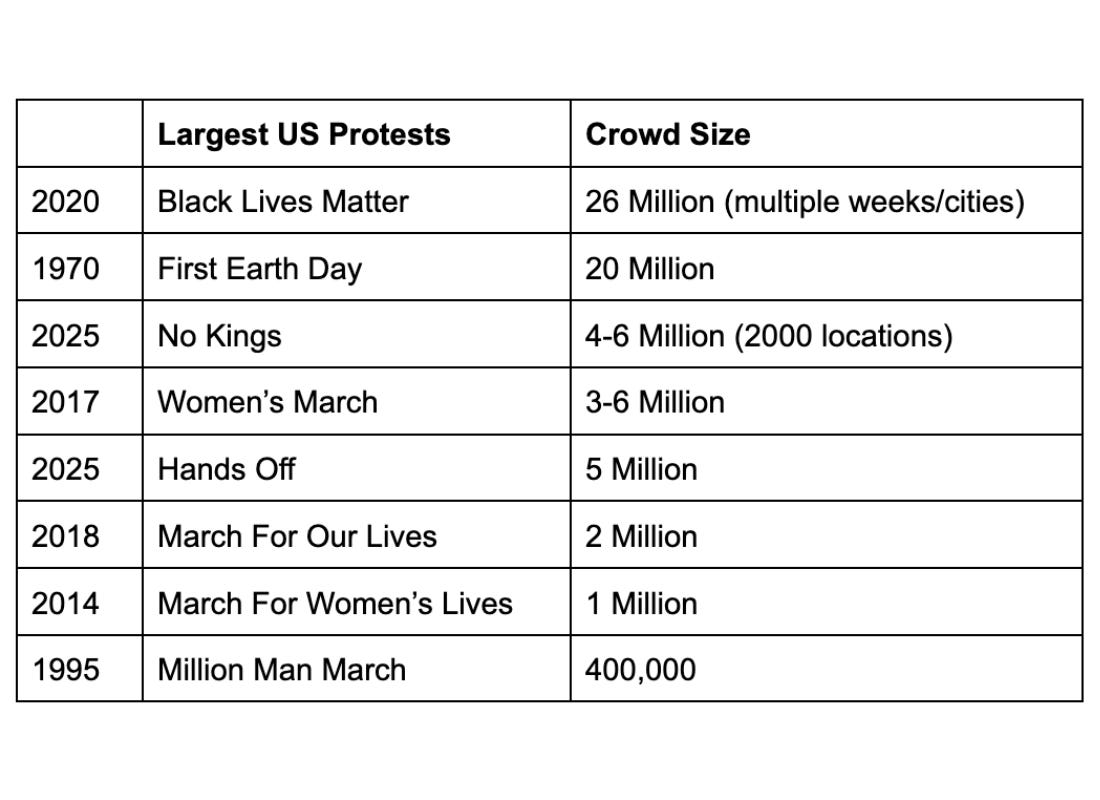Are You a Protester?
Andy Roo Forrest is the Executive Director of Feel Good Action, an organization using media, data, and behavior science to advance just societies and a healthy planet.

If you missed the last big election or the last big protest, you are not alone.
341 million people did not march in the last big protest. (June, 2025)
90 million people did not vote in the last big election. (November, 2024)
To be fair, these are not the same pools of people. Only citizens over 18 can vote. Anyone can protest. But even adjusted for group size, more folks vote than protest.
Protesting and voting are both forms of mass civic action. But clearly, there are differences between them, right? An election is a tightly regulated sequence of procedures with a clear outcome (or should be). It is a competition with a winner; a proclamation of public leadership. A protest is organic and unwieldy. It may be influential and produce real impact, but even after the trash gets picked up and the vegetation recovers, the crowd size and policy impact will forever be disputed.
Question #1: Are you a voter?
Question #2: Are you a protestor?
Are you able to answer one of these questions more decisively than the other? If so, do you know why? Let’s ask ourselves both questions. And perhaps, let’s ask a third question as well. I’ll get to that in a minute. First…
There is considerable research on non-voting. The primary self-reported reason non-voters give for their lack of action is “my vote won’t matter”. I’ve seen less research on non-protesting than non-voting, but I often hear the same reason cited: “It won’t make a difference if I protest”.
Just in the last 10 years, mass protests in Brazil, Chile, Poland, and South Korea played a critical role in saving democracy from autocratic rule. Even in the U.S., mass protests have often produced big changes. The 19th Amendment, the Civil Rights Act, the Voting Rights Act, the Clean Water Act, the A.D.A., the Endangered Species Act, etc. all advanced in the wake of mass public protests.
Protests can steer the course of history, especially at critical inflection points, especially when the government is out of step with huge segments of the population. The research of Professor Erica Chenoweth, an expert on non-violent conflict, demonstrates how just 3.5% of the population, when mobilized, can force major policy changes for the government.
So why don’t more of us protest?
Perhaps for the same reason that a huge swath of the electorate does not vote. While non-voters may claim “my vote won’t make a difference”, behavioral scientists report the real reason we vote or we don’t vote is largely due to “homophily” – the human tendency to associate and copy the behaviors of our social network. Non-voters are not surrounded by family, friends, neighbors or co-workers who vote, hence there are few social cues to vote. It’s not the norm. Is the same true for protesters and non-protesters?
Rather than ask ourselves whether we are a regular voter, or a regular protester, let’s ask ourselves do we want to be both? And if the answer is “yes” and we’re not doing both already, let’s start. Let’s get out of our comfort zone and make some new friends who are already getting it done. Let’s go to Mobilize (insert link) and find the next protest near us; let’s go Feel Good Action (insert link to check registration) and make sure we’re ready to vote.
At Feel Good Action, we harness the power of media, data, and behavior science to motivate action that advances just societies and a healthy planet. As a digital canvassing organization, we understand that participation in democracy takes many forms – from voting to peaceful protest. Media shapes public awareness, data reveals where voices most need amplification, and behavior science helps us understand what motivates people to act. Together, these tools empower citizens to express dissent, demand accountability, and strengthen democracy itself, ensuring we keep our republic of the people, by the people, and for the people.
Hope to see you on the street and at the ballot box.
—Andy




